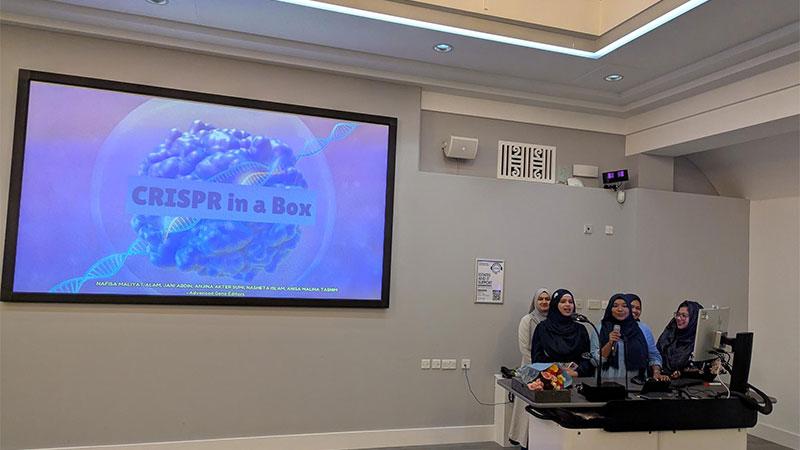The University of Westminster students have been awarded certificates for completing the University’s unique extracurricular Gene Editors of the Future programme which teaches students how to use the Nobel Prize-winning technology CRISPR. The celebration event also served as a platform to showcase Westminster’s vibrant community of emerging gene-editing student scientists committed to responsible and imaginative scientific exploration.

The Gene Editors of the Future initiative gives students from the School of Life Sciences the chance to work with the Nobel Prize-winning technology CRISPR and bridge innovation with curiosity and ambition. The vibrant student community is the longest and largest extracurricular initiative that focuses on the technology, which can be used to selectively modify the DNA of living organisms and has forever changed the landscape of genetic engineering across organisms. The programme has seen a majority of women participants, with students not only engaging actively in the training but also gaining access to a wide range of opportunities, equipping them with the skills to take on various leadership roles within the scientific community and the broader society. The programme demonstrates a promising shift towards inclusion and empowerment of women in shaping the future of science and technology.
Taking place on 13 June, the event began with a warm welcome from Vice-Chancellor and President Professor Peter Bonfield, who highlighted the importance of extracurricular activities in enhancing student engagement and improving graduate outcomes. Professor Dibyesh Anand, echoing the values of the women-led programme, encouraged students to break barriers and praised their dedication.
The evening featured captivating plenary talks by Dr Sandeep Sundararajan, a Technical Specialist at the Wellcome Sanger Institute, and Munuse Ceyda Savash Ishanzadeh, Westminster alumna and current PhD student at the University of Oxford, who delivered cutting-edge insights on the expanding frontiers of human gene editing.

Westminster student leaders also joined the line-up of presentations with Sophie Ismail, Rajaa Arnaout and Sofia Dhanani taking to the stage to give a compelling overview of the Gene Editors of the Future’s evolution and trajectory.
The audience was also treated to the Westminster CRISPR Cameos – a series of thought-provoking and creatively staged performances. These included My CRISPR Story by Westminster Research Fellow Dr Ifigeneia Kalampouka, CRISPR Song Q&A by Dhruv Sunil Choudhary and Sarbojoy Saha, Base Editors and CRISPR-Cas9 Interview by Sara Lala Gul, Fatuma Mohamed Hirsi and Veronika Sutova, and finally CRISPR in a Box by Nafisa Maliyat Alam, Anjina Akter Sumi, Jani Abdin, Nasheta Islam and Anisa Maliha Tasneem. Among the many highlights were undergraduate research presentations by Balvinder Kaur Dhillon and Maheen Muhammed from Queen Mary Centre for Undergraduate Research.
The celebration also included a crowd-favourite challenge CRISPR or Fiction?, a quiz led by Nadheerah Begum, Biomedical Science BSc Honours student, and Sinead Hynes, former Lecturer in Sport and Exercise Nutrition at the University of Westminster, which tested knowledge and sparked cheer across the room.
The night concluded with the awarding of Basic Human Genome Engineering Certificates to participating students by Dr Kalpana Surendranath, Reader in Genome Engineering and Director of the Gene Editors of the Future programme.
About the event Dr Sundararajan said: “It was an absolute honour to be invited to deliver a plenary talk at the Spring Celebrations event. The event was a vibrant showcase of the enthusiasm and dedication of students who demonstrated the knowledge and skills they have gained through this remarkable iteration of the programme. The unwavering support provided by Dr Surendranath, her team and the Vice-Chancellor has been instrumental in the success of this initiative. Their commitment underscores how a simple yet powerful effort to share knowledge can create meaningful change in the lives of aspiring students. The joy, creativity and accomplishments of the students - reflected in their diverse and engaging presentations - were truly inspiring. It was a privilege to be part of such a celebration, and I look forward to many more in the future.”
Munuse Ceyda Savash Ishanzadeh added: “As a proud alumnus of Westminster, it is always a pleasure when I am invited to meet the Gene Editors of the Future students and present my work in embryonic gene editing. It never fails to be such a proud moment to see how the students are engaging and, most importantly, enjoying the programme. Dr Kalpana Surendranath never fails to provide support and encouragement to all, and I am certain all students will reach great heights thanks to Kalpana. While I am honoured to be an Oxford graduate, Westminster always remains home to me.”
Dr Giuseppe Viola, Director of Queen Mary Centre for Undergraduate Research, added: “It was a great pleasure to attend the Spring Festival! The event followed a diverse line-up, which included excellent scientific presentations alongside creative showcases such as videos, songs and a witty comedy show. It was inspiring to notice the enhanced creativity, freedom of expression and emotional growth that students developed through immersive, whilst relaxed and inclusive extracurricular programmes, like the Gene Editors of the Future!”
Find out more about the Gene Editors of the Future programme.
Learn about Biological and Biomedical Sciences courses at the University of Westminster.









